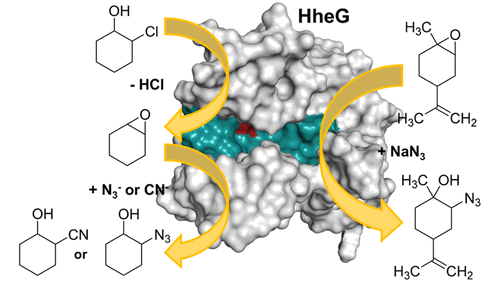EnzymoGenius™, our advanced enzyme AI design platform, explores cutting-edge design solutions related to AI-driven enzyme design, which has been tailored to advance scientific research in drug synthesis and biomanufacturing.
Background
Halohydrin dehalogenases are pivotal enzymes in biocatalysis, excelling at cleaving carbon-halogen bonds in halohydrin compounds. In drug synthesis, halohydrin dehalogenases play a vital role by selectively removing halogen atoms from complex molecules, enabling efficient and eco-friendly drug production. These enzymes ensure the precise synthesis of drug intermediates, reducing waste and environmental impact. In biomanufacturing, halohydrin dehalogenases are catalysts for producing bio-based chemicals and biofuels. Their versatility converts renewable feedstocks into valuable compounds, promoting sustainability and reducing dependence on fossil fuels.
 Fig 1. HheG, a halohydrin dehalogenase with activity on cyclic epoxides. (Koopmeiners J, et al., 2017)
Fig 1. HheG, a halohydrin dehalogenase with activity on cyclic epoxides. (Koopmeiners J, et al., 2017)
Artificial Intelligence (AI) has revolutionized enzyme engineering, especially in the context of halohydrin dehalogenases. AI-driven algorithms predict enzyme properties, optimizing their performance. This accelerates customized biocatalyst development for specific applications.
Products and Solutions Offering
High-quality Halohydrin Dehalogenases
- Tailored Specificity
- Enhanced Catalytic Efficiency
- Broad Substrate Compatibility
- Robust Stability
- Sustainable Biocatalysis
- Reliable Supply
Custom Solutions
- Enzyme Engineering. Employ state-of-the-art techniques for enzyme engineering, enhancing catalytic activity and selectivity.
- Process Optimization. Our platform optimizes enzymatic processes, resulting in higher yields and reduced production costs.
- Biomanufacturing Integration. Seamlessly integrate our enzymes into biomanufacturing workflows for improved efficiency.
- Analytical Support. Provide comprehensive analytical support to validate enzyme performance and ensure consistent results.
Process for AI Design ofHalohydrin Dehalogenases
1. Sequence Analysis and Prediction. AI facilitates the in-depth analysis of enzyme sequences, predicting their potential functions and substrates.
2. Rational Design. Utilizing AI-driven algorithms, researchers can engineer halohydrin dehalogenases with enhanced specificity and efficiency.
3. High-Throughput Screening. AI streamlines the screening process, identifying the most promising enzyme variants for drug synthesis and biomanufacturing.
4. Structural Insights. AI algorithms offer critical insights into enzyme structures, guiding the modification of halohydrin dehalogenases for optimal performance.
5. Directed Evolution. AI-driven evolution strategies allow for the development of customized enzyme variants tailored to specific applications.
6. Optimization of Reaction Conditions. AI aids in the determination of optimal reaction conditions, ensuring efficient enzyme catalysis.
7. Scale-Up and Biomanufacturing. AI facilitates the scaling-up process, ensuring the seamless integration of halohydrin dehalogenases into biomanufacturing processes.
8. Continuous Improvement. AI-driven feedback loops enable ongoing refinement and enhancement of enzyme design.
Why Choose Us?
- Precision Design. Our custom enzymes are designed with precision, ensuring they meet your project's exact requirements.
- Cost-Efficiency. We optimize processes to reduce costs and increase overall project affordability.
- Shortened Timelines. Our solutions accelerate research and development timelines, getting your products to market faster.
- Scientific Excellence. We employ cutting-edge biocatalysis techniques backed by extensive research expertise.
EnzymoGenius™ stands as a beacon of excellence, offering tailored enzyme solutions for halohydrin dehalogenases. Our commitment to precision, cost-efficiency, and environmental sustainability ensures that your drug synthesis and biomanufacturing projects reach their full potential. Contact us today to explore the possibilities of biocatalysis in scientific innovation.
Reference
- Koopmeiners, J.; et al. HheG, a halohydrin dehalogenase with activity on cyclic epoxides. Acs Catalysis. 2017, 7(10), 6877-6886.

































 Fig 1. HheG, a halohydrin dehalogenase with activity on cyclic epoxides. (Koopmeiners J, et al., 2017)
Fig 1. HheG, a halohydrin dehalogenase with activity on cyclic epoxides. (Koopmeiners J, et al., 2017)